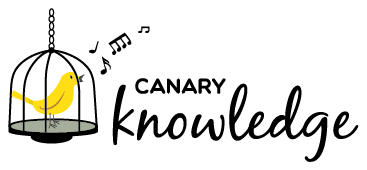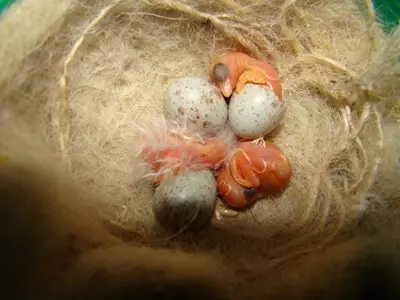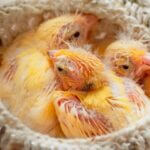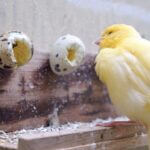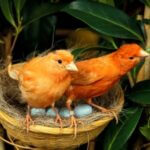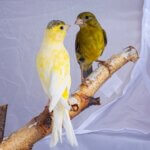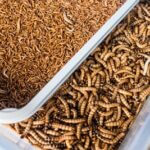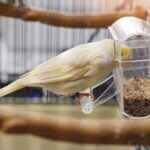When breeding canaries, it’s important to know when the chicks can be safely removed from their parents. This allows you to care for and sell the chicks at the right time, ensuring the parents aren’t burdened with chicks beyond their natural, expected timeline.
Baby canaries can be removed at 28 days old. However, this largely depends on how well they’re fed and the number of siblings. Baby canaries in broods of 3-6 chicks usually fledge more quickly than single canaries or those in broods of two chicks.
Removing chicks too early may lead to destructive behaviors, social problems, and issues with feeding themselves as adults. However, leaving them in the care of their parents for too long can upset their parents’ habits, hormones, and behaviors.
When Can Baby Canaries Leave Their Parents?
Baby canaries leave their parents after 17-24 days. However, different canaries will be ready to leave the nest and fend for themselves at different rates. This depends on the feed they receive during their formative weeks and the number of canaries in the nest.
Canary fledglings fed on protein-rich nestling food in the first 14 days of hatching are usually ready to leave the nest by the time they’re 16-20 days old. Alternatively, baby canaries that don’t receive enough protein in their diet can take 24 days or more to fully fledge.
So, canary babies in broods of 3- 6 chicks usually fledge more quickly than single or pairs of chicks because extra chicks in a brood mean that each chick receives less attention from its parents.
So, these chicks learn to fend for themselves much earlier. Chicks in smaller broods get more attention and care from their parents, so there’s no need for them to grow up so fast.
In any case, baby canaries depend on their parents for their nutritional needs. So, only separate the fledglings from their parents once they can eat soft food without any assistance from their parents.
At What Age Do Baby Canaries Leave The Nest?
Baby canaries are ready to leave the nest at around 17-24 days old.
At this point, most chicks can fend for themselves. However, they must still be nestled until they can eat adult canary foods, usually when they’re 4 weeks old.
Baby Canary Growth Stages
Canary babies often hatch after 14 days of incubation. Once they do, they’ll go through the following developmental stages:
Nestling Stage
At the end of the incubation period, canary chicks break out of their shells without the aid of their mother. During the first week after hatching, they’re sightless and featherless, wholly dependent on their parents for sustenance and protection.
Typically, the parent canaries share the responsibility of feeding and raising their chicks. According to Biological Sciences, parents distribute food to their nesting fledglings based on begging cues, including the chick’s proximity to the parents and their posturing and calling behaviors.
If you have newly-hatched canaries, provide ample nestling food for the parents to use when feeding their chicks. Recommended foods include softened vegetables, boiled eggs, and fresh fruits.
At about 7 days of age, the baby canaries’ eyes will open, and their pin feathers will start to develop. By the end of the second week, their bodies will be fully covered with feathers.
However, they’re still too young to leave the nest or fend for themselves at this point.
Fledgling Stage
At around 17 days, baby canaries are fully-fledged and ready to leave the nest.
However, some chicks may fledge much later (up to 24 days old), based on the kind of feeding they receive and the number of chicks in the nest. As mentioned, canaries in larger broods (3-6 chicks) tend to fledge faster than those in small broods (1-2 chicks).
Likewise, cold weather might slow down the rate at which canaries fledge. If you’re unsure whether your baby canaries are ready to leave the nest, check if they can eat soft food without assistance.
Remember, even if the baby canaries can eat by themselves, they’ll still be partially dependent on feeding by their mothers until they are about 27 days old. Don’t separate them quite yet.
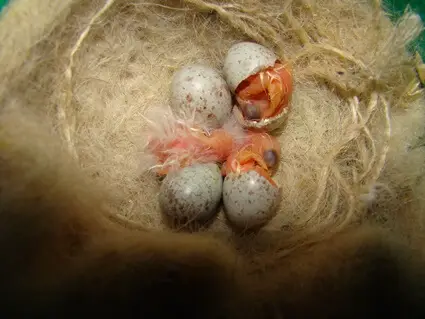
Weaning Stage
At 28 days, most canaries are fully weaned and completely independent, so you can safely separate them from their mother.
Be aware that some canaries will still beg for food from their mothers even after weaning. Don’t allow them to remain with their mother since they’ll interrupt the normal breeding cycle of the female. By the end of the fourth week, the mother should be preparing for another incubation cycle.
Once you’ve separated the juveniles from their mother and transferred them to their cage, provide them daily seed mixes and soft foods, like hard-boiled eggs.
These should be offered during their first week of independence. You’ll also need to replace their water daily to avoid contamination or bacterial and fungal infections.
First Molt
Once the baby canaries become independent, they remain juveniles until they have their first molt at about 8 weeks of age. During this period (also known as partial molt or soft molt), the young canaries replace all their feathers, except for the tail and wing feathers. The process typically lasts another 8 weeks.
The first molt can be physically draining for a canary. So, ensure it receives a protein-rich diet to replenish its energy and promote the healthy growth of new feathers.
Maturity/Adulthood Stage
Once the canaries experience their first proper molt, they’ll continue to grow independent of their mothers until they become sexually mature.
According to Behavioral and Neural Biology, the sexual maturation of canaries usually happens concurrently with the development of their adult song.
On average, most canaries mature at about 8 months old, although some may mature a bit earlier (6 months) and others much later (10 months).
How Soon Can Baby Canaries Feed On Their Own?
Most baby canaries try to eat on their own at 17-24 days of age. By this time, they’re ready to leave the nest, although they’re still somewhat dependent on their parents for food.
However, by the time they reach 28 days of age, most canaries are completely independent of their parents. They can start eating seed mixes and soft foods without parental assistance.
